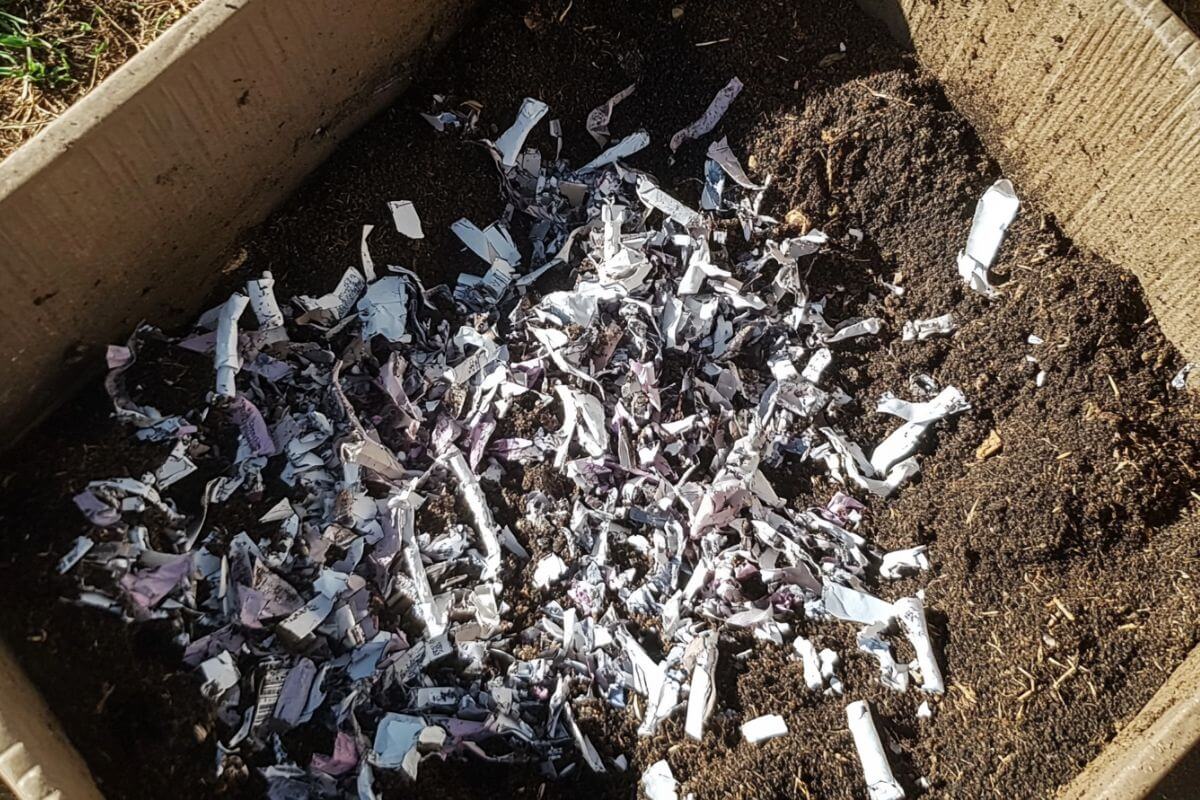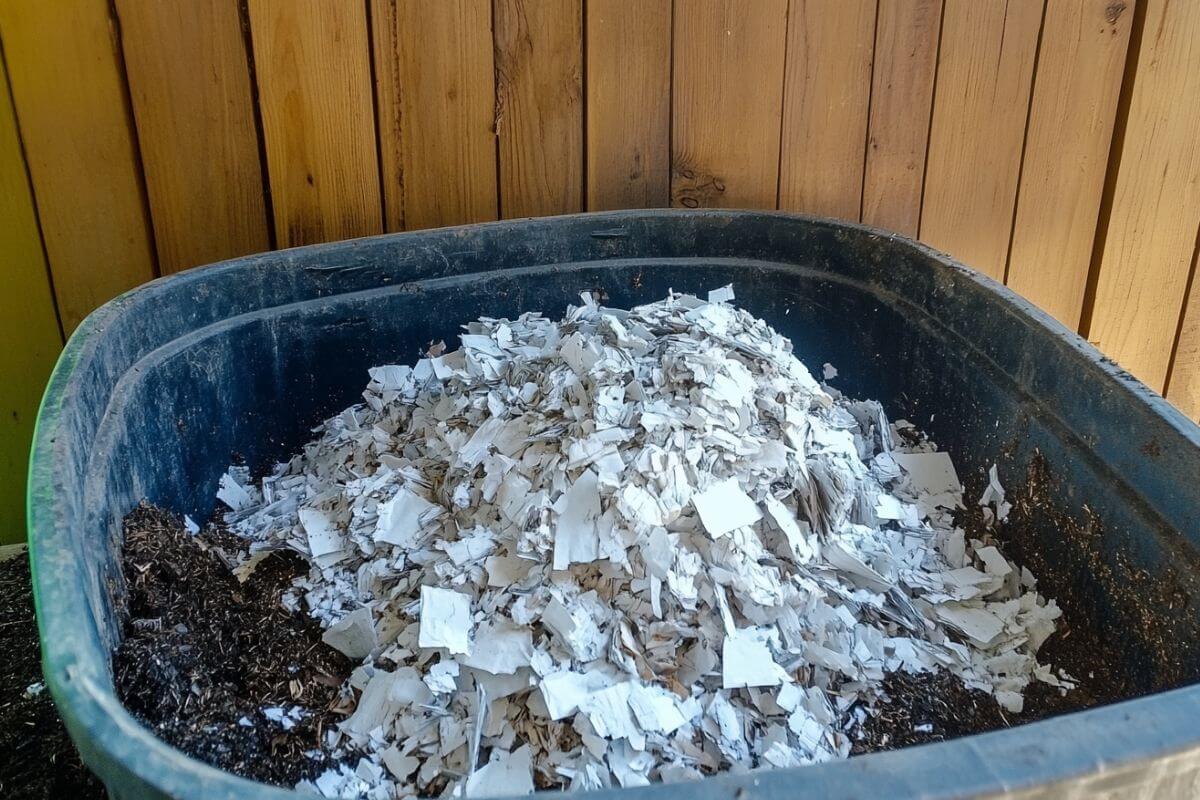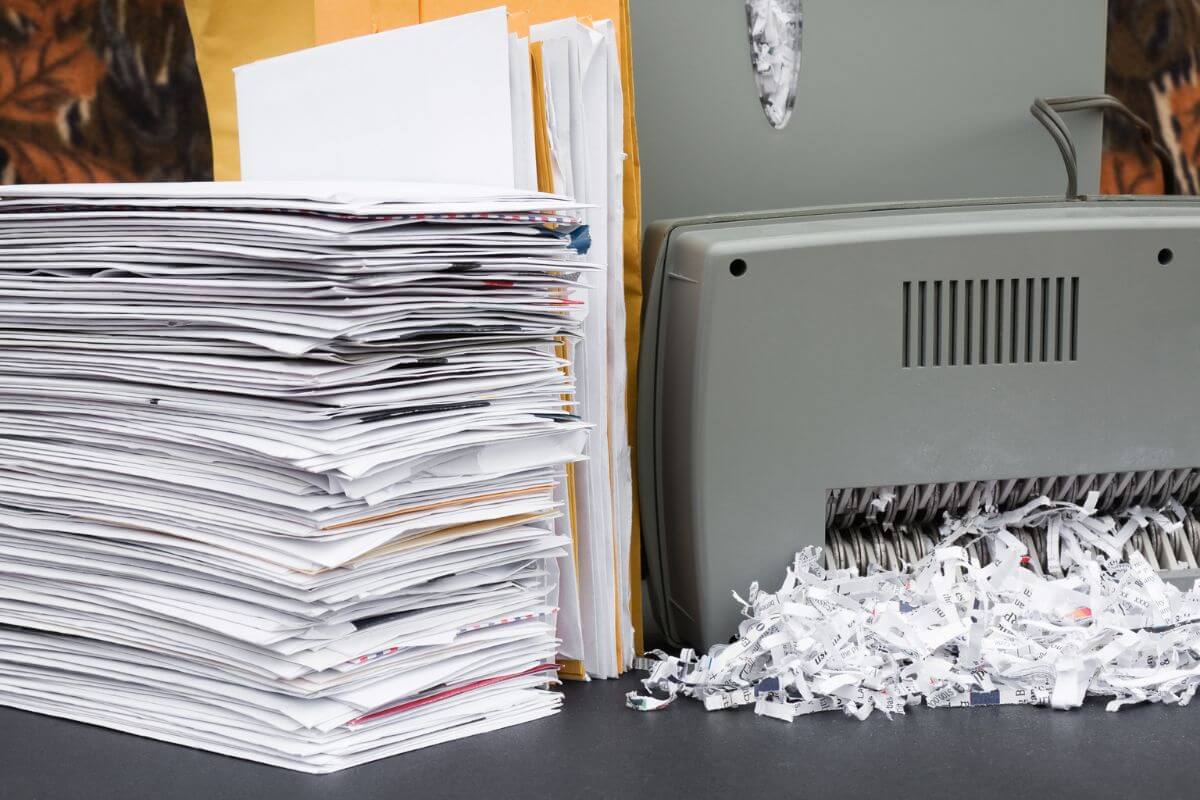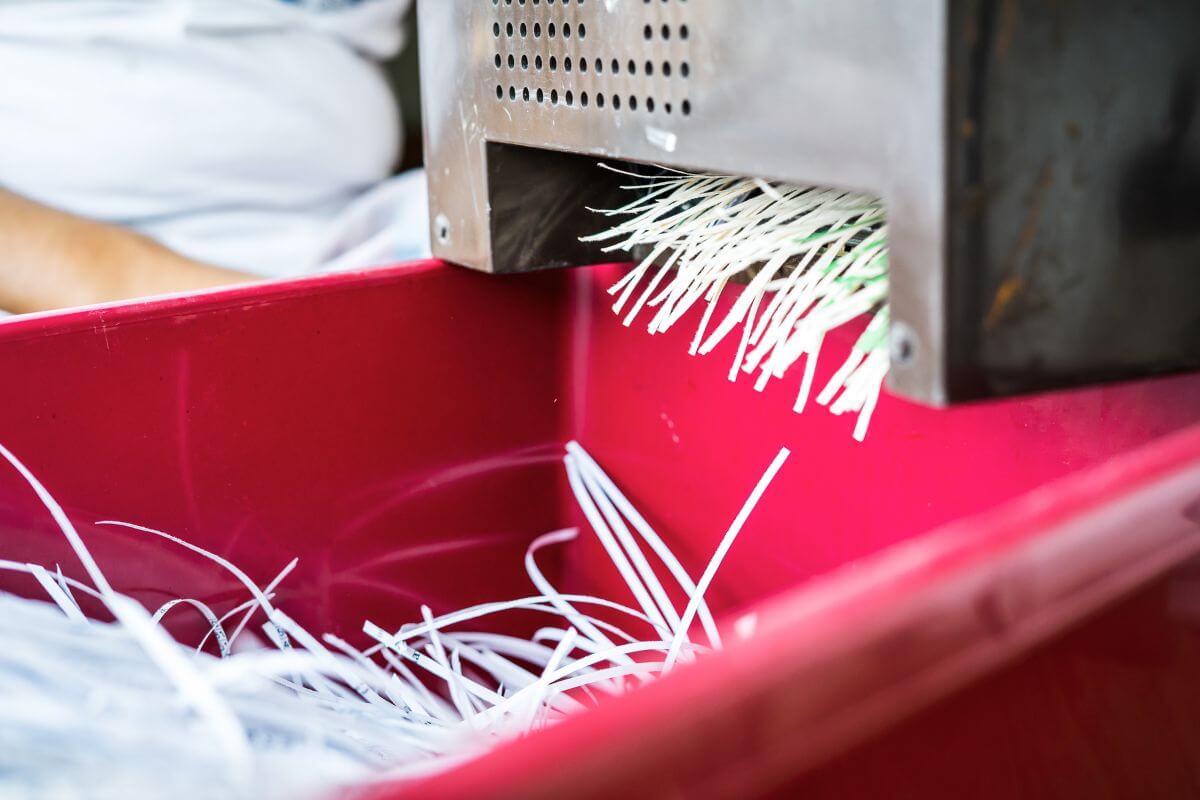When composting, you may think materials are limited to food scraps and garden waste. However, there are a lot of household materials that are just as suitable for composting. One of these is paper.
Paper is an organic material that will break down nicely in your compost. Really, any materials that are organic can – and should – be composted.
In this article I’m going to take you through the benefits of adding paper to your compost, which types of paper to avoid composting, and how to shred paper for composting.
Benefits of Shredded Paper for Compost

Paper is considered to be a brown material, which means it is rich in carbon. Browns are slower to decompose than nitrogen-rich greens, and are essential for a healthy compost.
If you don’t have much woody garden waste, your compost can become too sludgy and smelly. In these cases, paper is a great addition to your compost to soak up the excess water and slow down the decomposition of your plant/food materials into sludge.
As well as wicking the water away from soggy areas, paper will also help with moisture retention in your compost heap. So, it can help if your heap looks a bit too dry.
It also may surprise you, but worms love shredded paper! They will actively seek it out to eat, but if you have a wormery make sure you are mixing in a lot of other matter, as paper itself is not particularly nutritious for your little wrigglers.
Adding shredded paper to compost will cut down on waste that would otherwise end up in landfill. So, not only will it benefit you compost by adding volume and essential carbon, it will aid in waste reduction too!
When it comes to adding materials to your compost, it is always beneficial to shred them down before adding them to aid decomposition and paper is no different.
Always remember your green to brown ratio should be around 50:50, and while paper can be beneficial in compost, it doesn’t actually contain any nutrients. Adding too much paper material to your compost pile is not advised as it can tip the balance of carbon to nitrogen.
What Types of Paper Can Be Composted?

Really, any paper products can be composted. Most paper is made from wood pulp, but paper made from hemp or any other natural material is absolutely fine too.
Here is a list of paper that you may not have realized can go straight into your composter.
- Non-glossy Junk Mail
- Envelopes – Remove the cellophane window, if it has one.
- Office Paper – Including if it has been printed on.
- Children’s Drawings – If you can bring yourself to do it!
- Used Tissues (although it is not strictly necessary to shred these)
No matter these the paper type you want to use, don’t forget to remove staples and paper clips because they won’t decompose in the composting process.
What Types of Paper Cannot Be Composted?
This is a much shorter list than the ones above. While most paper is considered safe to compost, you may want to steer clear of paper that has been highly processed.
- Shiny, waxy, or glossy paper like magazines, photographs, and some leaflets.
- Colored paper and colored construction paper that’s popular with the kids should not be composted.
- Paper with fluorescent or metallic inks.
Paper production for these can use a lot of chemicals, so if you’re unsure, you may want to err on the side of caution and leave it out of your compost.
Still, even these papers that aren’t ideal can be composted, it just depends on how you personally feel about it. If the alternative is putting it into a landfill, then composting it may be the best solution.
If you want to keep your compost purely organic, you should be a bit stricter on which paper you add, but remember that your compost will break down and use most substances over time.
How to Shred Paper for Composting – 5 Ways

There are many ways to shred paper so it is usable in compost, and below I’ve listed the main ways you can do it. But before you shred your paper you will want to remove any foreign objects like staples, tape, cellophane, or plastic coating. I like to take the staples out, but you can add them to your compost as they will be broken down eventually and will add iron to your soil.
1. Hand-Shred Your Paper
Manually hand-shredding paper is good if you only have a small amount of paper to shred. Just rip your paper up into small 1” pieces and toss them on your compost pile.
2. Cut Up Your Paper With Scissors
Cutting with scissors is also best if you only have a small amount of paper to shred. While slightly less labor-intensive than hand shredding, your hands will get tired if you’re trying to cut your way through large stacks of paper!
3. Use Electric Scissors
A step up from using standard scissors, electric scissors will make short work of cutting up paper.
4. Use an Electric Paper Shredder

Electric paper shredders are by far the most popular way of shredding paper. If you work in an office, you can simply empty the shredder bins and take the paper shreds home to compost!
Many people have shredders at home nowadays as a security measure to destroy important documents. You can now take this security a step further and compost the shreds!
5. Soak the Paper
Soaking paper takes a bit more time, but is very effective as well. While not technically shredding the paper, it does break it down enough that it will decompose quickly in compost.
Soak the paper in water for a few hours, then swirl round the water to break up the soaked paper.
If your compost is looking a bit dry, then you can add the paper and water to your compost. Otherwise, let the paper dry a bit first, or at least wring out the excess water before adding it to your compost.
Soaking has the added benefit of removing any plastic that might be covering your paper. But even if you are adding soggy paper, remember that paper still counts as a dry, or brown, material and is not a good substitute for green material that contains lots of additional nutrients.
Shredding Paper for Compost Final Thoughts
There are a number of different ways to shred paper for composting purposes. The method you choose will depend on what type of paper you have available, and whether you prefer a manual or automatic process.
As long as you don’t mind the extra effort involved, there’s no reason why you shouldn’t try one of these methods. Even if you end up buying a new shredder, it won’t cost much money and will help your garden grow better!
Here are other helpful guides and articles on composting:
Shredding Paper for Compost FAQs
Is it okay to put shredded paper in compost?
Yes, it is fine to use shredded paper for compost. You may want to test a small amount first to ensure that the paper doesn’t create any odor. Also, remember to keep the pile moist, since too much moisture will cause mold growth. Composting is a great way to recycle waste paper into soil.
Is shredded paper good for the soil?
Shredded paper is carbon-rich and has been shown to increase organic matter in soil, which improves water retention and fertility. If you use shredded paper from office supplies, don’t throw them away! Instead, put them in compost bins.
Is shredded paper good for vegetable gardens?
Shredded paper is great for gardeners who want to use organic mulch around their plants. When you apply shredded paper to your soil, it helps prevent weeds from growing in your garden, while also improving water retention and aeration.
How long does it take for paper to break down in compost?
Paper breaks down in about 4 to 6 weeks, which is much faster than other organic materials such as food waste, grass clippings, and yard trimmings. Timing can be affected by your local environment and climate though. The only way to tell how much longer it takes is to watch the pile. If it starts to smell bad, you’ll know it’s working faster.
Can I compost junk mail?
Yes, you can compost junk mail. However, you need to be careful about which ones you put into the compost pile. Don’t throw in glossy papers and any heavily colored paper as they’ll contain chemicals you don’t want to get into your compost and soil.
Can I use shredded paper in my raised garden bed?
Yes! If you can use shredded paper to line your raised beds for added drainage and moisture retention. The shredded paper also makes a great mulch for your plants. Shredded paper is much cheaper than wood chips, and it decomposes into a fine dust which doesn’t clog up your water lines like peat moss.
Does shredded paper make good mulch for tomatoes?
Yes, shredded paper makes great mulch for tomatoes because it helps retain soil moisture. The best way to use shredded paper is to put it around the base of tomato plants. This prevents weeds from growing under the tomato plant and also protects the roots from drying out.
Can you compost shredded paper with ink?
Yes, you cancompost shredded paper with ink. However, be careful what kind of ink is on the paper. Some types contain toxic chemicals that may leach into the soil. The best is if the ink is non-toxic or vegetable-based. It can be difficult to know the type of ink though, so as long as it’s not a large amount of ink, it should generally be ok to compost the shredded paper.
Can you compost laser printed paper?
Yes, you can compost most laser printed paper. However, please be aware that some laser toners use synthetic polymers in order to bind the ink to the paper. If the paper is glossy, avoid composting it. There could be chemicals in both of these cases, so you don’t want to add it to your compost.
Can you compost books?
Yes, you can compost books. However, you should first remove any glue or staples from the pages. Also remove any glossy pages. Don’t forget your local library may also accept donations of used books for recycling. There might be other people out there who may want to read your books.


Thank you!!